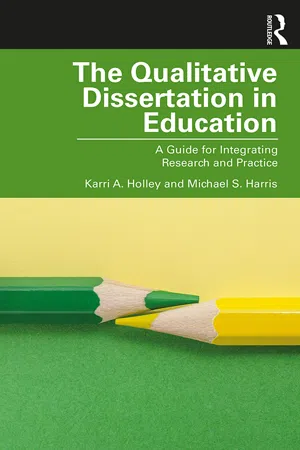![]()
PART I
Pre-proposal
![]()
A completed dissertation serves as an academic calling card, demonstrating a scholar’s future potential to academe and society as a whole. The Council of Graduate Schools (1995) suggests that a successful dissertation defense “marks the transition from student to independent scholar” (p. 9), while Katz (1997) asserts that the dissertation illustrates a scholar’s professional competence. While the dissertation stands at the center of the doctoral education process, representing the culmination of years of schooling and preparation, significant variation exists in the purpose, structure, and culture of doctoral education programs around the world. Traditional doctoral programs in the United States evolved from the German university model and its focus on advanced, specialized research. Professional doctoral programs such as the EdD (which originated with American academic institutions in the early 1900s before spreading to other countries) were influenced by the increasingly complex social, cultural, and economic forces in contemporary work life. These foundations are mirrored in differing dissertation structures for these programs. Specifically, the PhD dissertation focuses on original research and creating new knowledge, while the EdD dissertation leverages the expertise of practitioners who use existing research and theory to explain, understand, and improve professional practice.
Students enrolled in professional doctoral programs bring a wealth of experience and expertise to the academic landscape. Professional doctorates are distinct from traditional PhDs in that degree recipients usually seek to enhance their existing professional careers rather than transition into faculty or research-intensive roles. A common variety of the professional doctorate, the Doctor of Education (EdD), prepares professionals to assume or advance in leadership positions across multiple sectors of education. A professional doctorate in education facilitates the development of knowledge, skills, and abilities necessary to address real-world education and leadership challenges. The culmination of the professional doctorate program in education is the EdD dissertation, similar in multiple ways to dissertations completed by traditional PhD students. Both types of dissertations enable students to demonstrate their research skills and generate knowledge, which can then be applied to problems of professional practice (Neumann, 2007). Yet significant differences exist—in process, timeline, outcomes, expectations, and methodological approaches—between PhD and EdD dissertations (Costley & Armsby, 2007; Hochbein & Perry, 2013).
When considering the applied nature of the professional doctoral dissertation, qualitative research methodologies can be a logical fit (Hatch, 2002; Thorne, 2016). In describing qualitative research, Thorne (2016, p. 12) claims, “Much that has to do with the human experiential and behavioral world of applied practice … requires a distinct form of inquiry.” Education represents a particularly fruitful field for research, especially within projects that look for meaning in context (i.e., by analyzing an event as it occurs in its real-world setting)—an inherent goal of qualitative research. In this chapter, we provide a foundation to understand both the basics of qualitative research and the expectations of the EdD dissertation. We begin with an overview of qualitative research before discussing the unique characteristics of the EdD degree.
What is qualitative research?
The desire to understand the lived experiences of people and the ways in which they make sense of their everyday lives rests at the core of qualitative research (Merriam, 2009). Unlike research studies in which settings are controlled, such as laboratory experiments, qualitative research typically occurs within natural, real-life environments such as schools, neighborhoods, and businesses. Researchers working with qualitative methods conduct naturalistic inquiry, examining real-world settings with an inductive mindset. Quantitative approaches commonly develop a hypothesis and then collect data to test the hypothesis, while qualitative approaches employ an inductive outlook, allowing data to emerge and shape understanding. From the emergent data, the researcher generates patterns, themes, and categories that offer insight and new knowledge.
These patterns, themes, and categories facilitate stories that illustrate research participants’ diverse perceptions of reality. During the course of the study, the researcher develops a greater understanding of the participants’ lived experiences, such as the experiences of a first year teacher, college student perceptions of campus life, or the relationship between a superintendent and a board of education. Qualitative research begins from the assumption that reality is not objective but subjective—constructed by individuals interacting with their social world. This assumption means that qualitative researchers do not generally predict or conjecture but rather seek to understand and richly describe the realities in which their participants live. Patton (1985) emphasizes that qualitative research comes from:
An effort to understand situations in their uniqueness as part of a particular context and the interactions there. This understanding is an end in itself, so that it is not attempting to predict what may happen in the future necessarily, but to understand the nature of that setting.
(p. 1)
Through qualitative analysis, researchers describe what is happening in the setting under examination. How are people experiencing what is happening? How do they understand their circumstances? How do they interact with others? Qualitatively oriented questions might examine “how” or “why,” such as how a nontraditional student accesses information about college policies. Questions might also focus on “why,” like why a school adopted a new schedule. Qualitative researchers analyze and share participants’ subjective experiences and describe in great detail the setting in order to increase the reader’s understanding of the situation or context. In its focus on setting, qualitative research represents “a situated activity that locates the observer in the world. It consists of a set of interpretive, material practices that makes the world visible … This means that qualitative researchers study things in their natural setting” (Denzin & Lincoln, 2008, p. 4).
As you may discern from these descriptions, qualitative research is an umbrella term for a variety of approaches to studying human behavior and meaning-making within specific contexts. The qualitative researcher serves as the instrument for data collection, making the process fundamentally social and human. This reality inevitably means that no universal approach to conducting qualitative research exists. While quantitative research focuses almost exclusively on numerical data, qualitative research encompasses a wide array of data. For this reason, many students initially express concern or confusion about the nature of qualitative data. What is it? Where does it come from? Simply put, words (interview transcripts, published writing, fliers and marketing materials, etc.), pictures, videos, and other typically non-numeric information comprise qualitative data. Qualitative data commonly represent information that may not be quantifiable, such as social interactions, experiences, and perceptions.
Although students often place the qualitative and quantitative research approaches at opposite ends of a methodological continuum (and situate mixed-methods research in the middle), qualitative research is not inherently the opposite of quantitative work. Instead, each approach “presents a different view of the phenomenon studied and uses different means to persuade the reader of the validity of the conclusions drawn” (Firestone, 1987, p. 16). Assumptions about the world, the research purpose, the research approach, and the researcher’s role are key differences between qualitative and quantitative methods. The uniqueness of qualitative data extends beyond its non-numerical nature. Qualitative and quantitative data ultimately serve different, yet mutually reinforcing, purposes (Merriam, 2009).
Paradigms, or the basic beliefs and worldview that guide the researcher, constitute the theoretical underpinnings of qualitative research. Corbin and Strauss (2008) further explain a paradigm as “a perspective, a set of questions that can be applied to data to help the analyst draw out the contextual factors and identify relationships between context and process” (p. 89). Interpreting qualitative research means understanding that researchers operate within paradigmatic norms, which are typically defined through the lens of naturalism or social construction. Naturalism suggests that social life is best understood in the natural environment, while social construction concludes that the nature of knowledge and reality originates through human interaction. Scholars often group these two paradigms together as interpretive.
Researchers who adhere to principles of naturalism focus on social life in the setting where it occurs. Their studies are highly descriptive as a way to understand the setting, and have limited to no generalizability. The researcher plays a critical role. Bloor and Wood (2006) conclude, “The researcher is no neutral observer but is his or her own research instrument, seeking empathetic appreciation of a culture through the experience of co-participation” (p. 124). The related paradigm of social construction assumes that repeated, regular interactions establish patterns of meaning in the world and serve to construct reality. Language is the central means by which people make sense of the world and engage in these patterns. As a result, questions of knowledge are paramount: Who has knowledge? Who generates knowledge? What counts as knowledge?
Important assumptions related to the interpretive paradigm, and therefore to the practice of qualitative research, include: 1) that there are multiple, different, and sometimes conflicting realities; 2) that understanding a particular topic must incorporate the time and context of the topic; 3) that knowledge cannot be separated from the person holding or generating the knowledge; and 4) that the act of research can never be fully objective (Guba & Lincoln, 1994). These assumptions remind researchers about issues such as conditions (the why-where-how and what questions related to the topic), interactions or emotions (how people felt about these situations), and consequences (what happened as a result) (Corbin & Strauss, 2008). Making the case for pursuing qualitative research for your dissertation requires demonstrating how the research question and proposed methods best align with the interpretive paradigm and these assumptions.
When to use qualitative research
Qualitative data can sometimes be collected where quantitative data cannot. Quantitative data can delineate the outcome of a specific process, while qualitative data can be used to understand structure, context, or nuances. Next, we discuss the various circumstances when you might turn to qualitative methods for a research study generally or a dissertation more specifically.
When the topic is not well understood
In quantitative research design, a basic understanding of the topic proves critical to identify independent and dependent variables, create a statistical model, or compose survey questions. However, numerous real-world occurrences do not meet this basic level of understanding. If a researcher does not yet understand what students’ mastery of a certain skill taught through a social-emotional learning curriculum looks like, for example, designing a quasi-experimental study measuring the curriculum’s efficacy is difficult if not impossible. In such a situation, qualitative research may be the most viable option, allowing the researcher to enter a setting, ask wide ranging questions, and begin to make sense of what is occurring. After an exploratory qualitative study, researchers may use their newfound knowledge to employ other qualitative as well as quantitative methods. In this example, an exploratory study might lead to a list of behaviors that typify students who have learned relevant skills; further research can now assess the presence or absence of these behaviors as a function of the curriculu...






